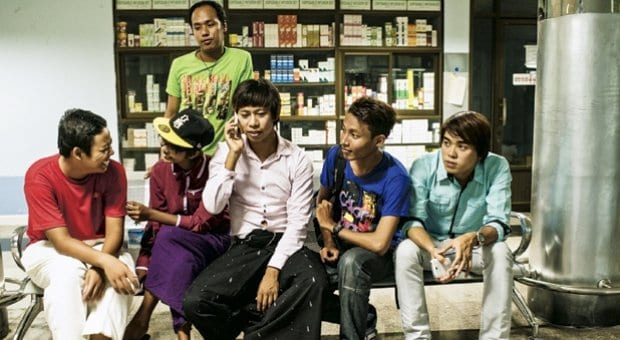
Harry (second from left), a 17-year-old lesbian from a working-class family in Mandalay, with her friends from a local organization that promotes LGBT rights. The 17-year-old says she’s found a second family at the organization, where she is respected for who she is. Credit: Vincenzo Floramo
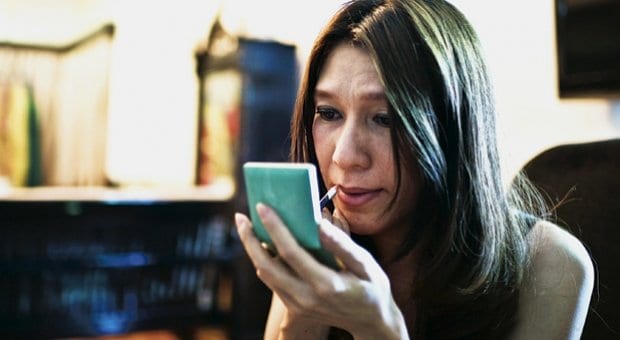
Pouk Pouk, dubbed the “fairy godmother” by some of her friends, is one of Burma’s most famous fashion designers. Credit: Vincenzo Floramo
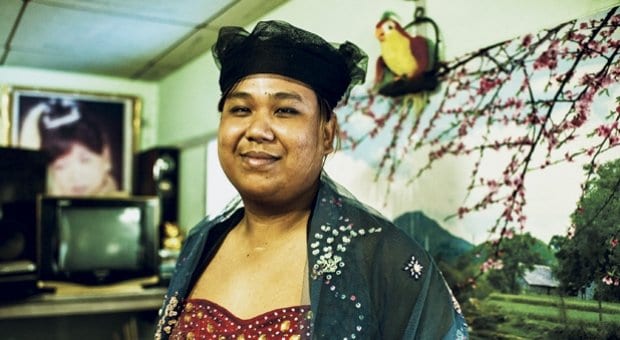
Ma Pwint is a crossdressing makeup artist from Mandalay who often dresses as a nat, or Burmese spirit, and dances at festivals across the country. Credit: Vincenzo Floramo
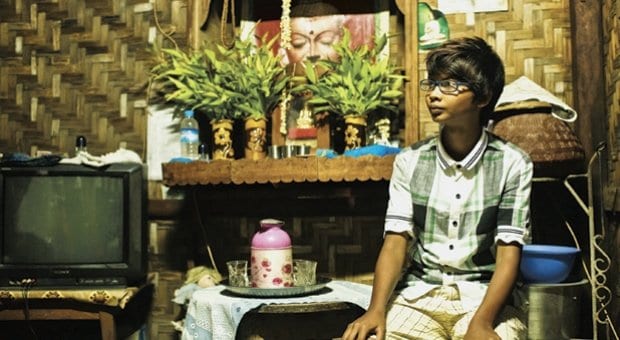
Harry says she’s always felt ridiculous dressing in typical girls’ clothes. Credit: Vincenzo Floramo
Last year, on a sweltering evening in July, a dozen old men sat around a podium in a cavernous hall in Mandalay, the second largest city in Burma (also known as Myanmar). A group of crossdressing men wearing shimmery outfits approached the podium to pay respect to the men by kneeling on the floor. The group at the podium included some of the eldest gay people in Mandalay, and they were receiving homage from the local LGBT community.
Burmese society places great importance on seniority, and the LGBT communities are no exception. But the ceremony serves another purpose. Because the gay veterans don’t have children, at their advanced age they have more difficulties than heterosexual men, who have offspring to help make ends meet. Thus the ceremony also provided an occasion to give the men donations collected among the local gay community.
Many members of the Mandalayan LGBT community attended the ceremony, as well as several families with children. The fact that such an event takes place at all might give the impression that LGBT people are socially accepted in the country, but Burma is far from being a paradise for queer people. Only two weeks before the event, police detained 12 gay men in Mandalay. The men had reportedly been hanging out and chatting near the luxurious Sedona Hotel, a known meeting point for gay people in the city. A report from the Asian Human Rights Commission says the police allegedly beat and humiliated the men — including forcing them to do “frog jumps” — in order “to correct their behaviour.” Police then released them on bail.
Such incidents are not new in a country where homosexuality is technically illegal. A penal code passed during British rule forbids “unnatural sex acts,” and no government has abolished it since Burma attained its independence in 1948. Yet only a few days after their arrest, the gay men who had been detained did something with no precedent in the country: instead of being cowed by the abuse or staying silent as the police had demanded, they spoke out at a press conference and denounced the abuses they had suffered.
A few months later, the country’s new LGBT Rights Network publicly called on the government to do away with 19th-century laws that allow officials to discriminate against the LGBT community.
Burma has been undergoing a process of political transition ever since the generals who ruled the country with an iron fist for five decades decided to establish a quasi-civilian government two years ago. This transition has brought the relaxation of censorship in the media, the release of hundreds of political prisoners and the mushrooming of civil society organizations that would have previously operated clandestinely.
The LGBT communities are also organizing, giving birth to an incipient movement to reclaim their rights.
Perhaps the most famous LGBT-rights advocate is Aung Myo Min, a 47-year-old man who was able to return to the country last year after 24 years in exile for his political activism. Shortly after his return, he founded Equality Myanmar, an organization with offices in Rangoon (also known as Yangon), the former capital and the country’s biggest city, and Mandalay.
His is the first organization to work on LGBT rights in Burma; albeit, its scope is not limited to this. The NGO has been quite active since its inception: “In April, we were able to set up the Burma LGBT Rights Network, including small organizations from 13 areas across the country,” Aung Myo Min says.
He says the fact that the people detained in Mandalay decided to speak out indicates that something is changing in the Burmese LGBT community. “I see the empowerment from zero to hero, from nothing to something. Even if we face legal failure against the police, this kind of thing makes everyone more motivated and encourages them to stand up.”
But the LGBT communities don’t have to surmount only legal obstacles and those set up by the police. Burma is a Buddhist-majority country where religion plays a big role — the prevailing mentality is deeply conservative, largely because of 50 years of almost complete isolation under the dictatorship. According to Aung Myo Min, many Buddhists regard LGBT people as “strange creatures” who are being punished in their present life for sins committed in previous incarnations.
Under these circumstances, a gay scene is almost non-existent. Other than in Rangoon — where some discos host monthly gay nights — few gay or lesbian spaces exist in the country. In Mandalay, a much more conservative city, there is not a single gay bar.
But there are festivals devoted to the nats, popular spirits much worshipped and sometimes feared in the country, to which many people give offerings to improve their luck. In these festivals, intoxicated men dance dressed as their particular nat. Usually only men dance, impersonating both male and female nats, and the nat festivals have turned into meeting places for gay people.
Zin Min Htun, a 32-year-old makeup artist from Mandalay who prefers to be called by the feminine Ma Pwint, knows the world of the nats well. He also knows how a gay man has to struggle in Burma. He realized he was gay at the age of 12. When he was 21 years old and at university, he decided to come out of the closet during a nat festival. Dressed as a female nat, he went to the festival to dance, but his father found him there and took him home, where he beat him for hours and kept him locked in his room for a week.
After that, he went to live in another city and pretended to be heterosexual. But after three years he moved back to Mandalay to come out once and for all. He now lives with his parents, an old and conservative couple who still cannot bring themselves to accept his homosexuality, and is one of the best-known faces in the local gay scene. He dances often in nat festivals across the country.
Life is not any easier for lesbians. “Harry,” a 17-year-old student from Mandalay who volunteers in a local NGO promoting LGBT rights, also faces challenges at home. Her father, a cab driver, does not accept her homosexuality and her mother and grandmother accept it only reluctantly; her mother contents herself thinking that at least Harry is not in danger of getting pregnant, and her grandmother believes that this is just a phase that will pass.
But Harry does not have any doubt about her sexual orientation. This thoughtful and mature tomboy has always “felt ridiculous” dressing as a girl and feels “free dressing as a boy.” She loves to play football, a sport reserved for men in Burma, and claims that she feels at home only in the NGO headquarters. “It’s like a second family” where she is respected in a way she rarely experiences elsewhere. In any case, she believes that lesbians are slightly less discriminated against in Burma because many people believe that tomboys will be men, widely regarded as superior to women, in their next reincarnation.
In this environment, some prefer to wait before being open about their homosexuality at home. That is the case for “TJ,” a 19-year-old boy who left his home village in Magway Division two years ago to study English in Mandalay. His friends in the city know his sexual orientation and support him, but he has not come out to his family. “I know my parents will understand me when they find out, because they love me so much,” he says in his soft voice, “but I will wait until they ask me to tell them.”
Not all LGBT people in Burma lead anonymous lives. One of the most famous fashion designers in the country is Pauk Pauk. The designs of this 42-year-old trans woman are demanded by actors, pop stars and women of Burmese high society. But her path to success has not been easy. It took her from the town of Mogok, where her mother ran a hairdressing business in which Pauk Pauk first learned the ropes, to Milan, where she studied design before eventually rising in the profession.
Pauk Pauk has suffered insults because she is different and at times has been under constant threat of sexual harassment. But now she is in love with an actor from Rangoon who fully accepts her as she is: “I’ve always felt like a woman, a Burma woman who has never sought easy sex, but rather a relationship of love.”
While Burma might be years from displaying the proverbial tolerance toward LGBT people found in its neighbour country, Thailand, incidents like the arrest in Mandalay are starting to generate some debate about LGBT rights among the public at large.
Discussions about same-sex marriage are not on the agenda, but there are people who are ready to bring them to the table: “I don’t know about others, but I’m ready for that. I would say that the debate should be activated,” says Aung Myo Min, with characteristically cautious optimism.
In the meantime, LGBT Burmese live their lives negotiating with their own identities in an environment where role models and support from others is scarce. And they struggle to find their place in a society where they are still looked upon as “strange creatures.”
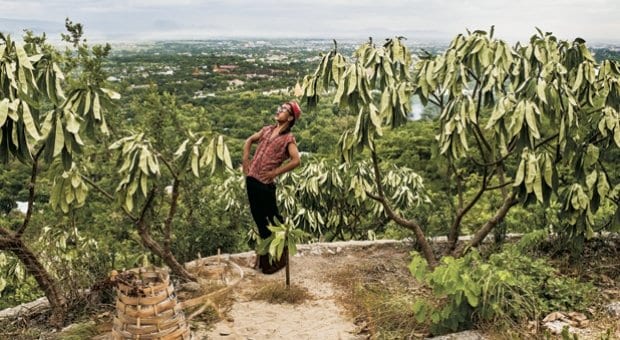
 Why you can trust Xtra
Why you can trust Xtra


